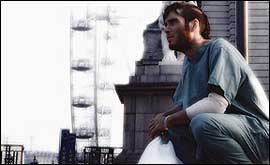
|
28 Days LaterBy David MumpowerMay 13, 2003
If you have seen the trailer for 28 Days Later, you already know the genesis for this post-apocalyptic horror flick. In less than a month, a virus has swept across the world, eradicating human sentience and reducing the body of humankind to a zombie state. The film coincidentally starts at basically the same moment that Resident Evil left off, but while there might be a surface similarity between the two productions, any resemblance definitely ends there. 28 Days Later chooses to make George Romero proud by taking the road less traveled for the zombie genre. Storied director Danny Boyle has created a narrative about the way people behave in panic situations. This is a film about troubled characters and the lies they tell themselves in order to better accept unimaginably trying times. There are certainly a few darkened hallway sequences where the audience will jump out of their seat in fear but for the most part, 28 Days Later is a psychological thriller rather than a pure slasher. In many ways, it's the film that Reign of Fire wanted to be. The story is told from the perspective of Jim, a man who awakens from a coma to find himself in a hospital bed. As he arises, a bit of reconnaissance alerts him to the fact that he appears to be the only person in the massive facility; moreover, after a few moments outside, he realizes the entire human race has vanished from the ordinarily crowded streets of his English homeland. Things go from very bad to a Tim Burton nightmare when he is accosted by unexpectedly spry zombies who attempt to spray him with some form of airborne viral mucus. At this point, a duo heroically dives in to remove him from harm's way yet Jim's peril has only begun. Once the strangers take him to their safehouse and explain the status of this recently doomed generation, Jim is faced with the scope of the apocalypse. The movie follows his journey as he searches for surviving family and grows to accept his gloomy fate and move forward. Joining him on the journey at first are his saviors/informers, Selena and Mark. Later on, the ever-changing group adds a father/daughter tandem in Frank and Hannah and eventually a military brigade led by Major Henry West. Along the way, all of the parties involved face harrowing encounters with the altered beasts whose poisonous fluids have the ability to deconstruct a person's cognizance. The fallout of these encounters is a brutal impact on a person's psyche and capacity to differentiate right from wrong. The implicit struggle of the individuals becomes keeping their humanity and not growing to become similar to the monsters they face. It's this quest for maintained identity which makes 28 Days Later a marvelous think piece. The plot takes numerous twists which at times leave the viewer surprised and shocked yet when taken in compilation, they add up to a single masterful story about entropy. No matter how polite and good-willed you might consider yourself and the world around you to be, 28 Days Later accurately depicts a scenario where many of the actions which you along with a court of law would determine criminal become acceptable norms thanks to the inherent dangers of group think and situational ethics. As with all of the best horror films, 28 Days Later works best when it shows that even in a population comprised largely of zombie mobs, the most dangerous animal is always man. Well-acted and impeccably paced, the casual nihilism offered by Danny Boyle, the artist behind Trainspotting, shows a darker side of the human condition which is always bubbling beneath the surface. When faced with conflict, it's that aspect of our nature which is most likely to take control, causing us to become paranoid, defensive and violent. Those of the survivors who fail to suppress this aspect of their personalities become every bit as dangerous as the undead beings chasing them. This inability to trust or rely upon few if any of his fellow questers makes Jim's plight particularly desperate and poignant. It also makes him a sublime hero faced with the task of keeping himself along with what's left of the human race alive while not giving up that coil of his being which makes him mortal. His attempt to survive exists on dual levels and it's this Romero-inspired archetype which signals the film's greatest accomplishment. Read what She Said about 28 Days Later. View other columns by David Mumpower |
Wednesday, December 17, 2025
© 2006 Box Office Prophets, a division of One Of Us, Inc.